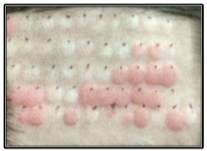Environmental Allergy Testing
By Loren Candito DVM, DACVD
Summer is right around the corner. Along with warmer weather and days at the beach comes another challenging allergy season for our itchy patients.
Environmental allergies are such a frustrating condition for our patients and clients. There is absolutely a role for the newer symptomatic immunomodulatory therapies (Cytopoint, Apoquel, and Atopica), and there are still conditions where steroids are still indicated, but we may best serve patients and clients by using these treatments to improve immediate comfort, while performing our allergy work up to aid in long-term comfort. For chronic allergy patients, allergen specific immunotherapy is a safe and often very effective therapy that should be considered as a first line treatment option.
Allergen specific immunotherapy is the only allergen treatment that has the potential to reverse the atopic condition, and offers a safe and effective therapy that minimizes the need for long-term immune suppressing medications for many patients.
Which patients are good candidates? Any dog or cat that is greater than 1 year of age, with seasonal signs or year round signs that have no response to a strict elimination diet trial, is a candidate for allergy testing.
Special considerations for testing: For environmental allergy testing, both intradermal testing and serum allergy testing is ideally recommended for every patient, as some pets test better on one test than the other and often the results do not entirely overlap between the tests (serum testing does have an increased risk of false negatives and false positives over intradermal testing). Standard Northeastern regional allergens are used, and special allergens of interest to clients can also be included with intradermal testing (rabbit dander, cat dander, and so on).
 Intradermal testing procedure and outcome For skin patch testing, a light sedation is used, and the test site usually no bigger than 8x8cm, minimizing cosmetic disruption of the coat. Northeast regional allergens are tested via injections into the skin with tiny needles, with results of inflamed, red skin if allergy is present within 20 minutes. Based on the results, a customized serum called allergen immunotherapy will be created to be administered via weekly to bi-weekly allergy injection or daily oral drop.
Intradermal testing procedure and outcome For skin patch testing, a light sedation is used, and the test site usually no bigger than 8x8cm, minimizing cosmetic disruption of the coat. Northeast regional allergens are tested via injections into the skin with tiny needles, with results of inflamed, red skin if allergy is present within 20 minutes. Based on the results, a customized serum called allergen immunotherapy will be created to be administered via weekly to bi-weekly allergy injection or daily oral drop.